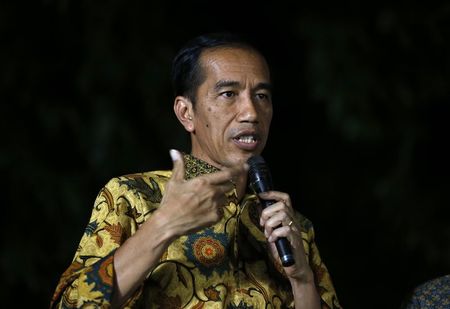Indonesia’s president-elect eyes swift fuel hike to boost budget

By Eveline Danubrata and Fransiska Nangoy
JAKARTA (Reuters) – President-elect Joko Widodo will sit down with Indonesia’s outgoing leader next week in the hope of reaching an agreement to raise fuel prices before the handover in October, a move that would help ease budget-sapping subsidy costs.
The Constitutional Court on Thursday gave Widodo the green light to lead Southeast Asia’s largest economy from its worst slowdown since the global financial crisis.
The court, as expected, unanimously upheld last month’s presidential election result, rejecting a last-ditch attempt by losing candidate Prabowo Subianto to force a re-vote. Widodo will begin his five-year term on Oct. 20.
Indonesia markets responded positively to the ruling on Friday. The rupiah and Indonesian government bonds rallied, while stocks hit a near 15-month high before turning negative.
With the legal hurdles out of the way, the 53-year-old Widodo is expected to step down soon as Jakarta governor to focus more on the transition.
Atop Widodo’s agenda is to address a ballooning fuel subsidy bill that is eating up on an already tight budget and threatening investor confidence by widening the current account deficit.
“I need spending space,” Widodo told reporters on Friday. “If we can do (the price hike) now, it will be a lighter burden.”
A presidential spokesman said outgoing President Susilo Bambang Yudhoyono would meet with his successor next week.
Widodo and Yudhoyono have already held private talks about an increase in fuel prices and were looking at imposing the measure in September, two sources close to the matter told Reuters last month.
SPENDING SHIFT
Subsidies are driving the budget deficit uncomfortably close to a legally-binding 3 percent limit, leaving little room for Widodo’s new programmes.
The one-time furniture salesman told Reuters last month he wanted to shift spending on fuel subsidies – which account for around 20 percent of the budget – to areas such as education, health and agriculture.
“Removing fuel subsidies is one of the key tests for Jokowi when he comes to power. He has to do it gradually, rather than in one shot,” said Wellian Wiranto, economist at Singapore’s OCBC Bank.
Also on Widodo’s to-do list is the formation of his cabinet, which he says will be dominated by technocrats.
He said he would start making his choices in mid-September and announce his cabinet shortly after his inauguration.
“We will look at how many ministries we need, if we need it slimmer or fatter than what we have now,” Widodo said.
Widodo has formed a high-powered advisory team to handle his transition to power, choose a cabinet and prepare a policy roadmap.
The team is headed by Rini Soemarno, an influential, U.S.-educated businesswoman who served as trade minister and is a former head of PT Astra International, Indonesia’s biggest automobile distributor.
(Additional reporting by Gayatri Suroyo; Writing by Randy Fabi; Editing by Jeremy Laurence)